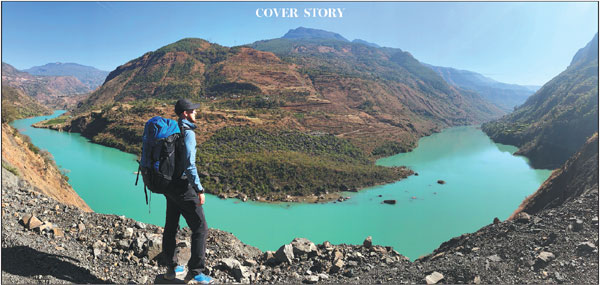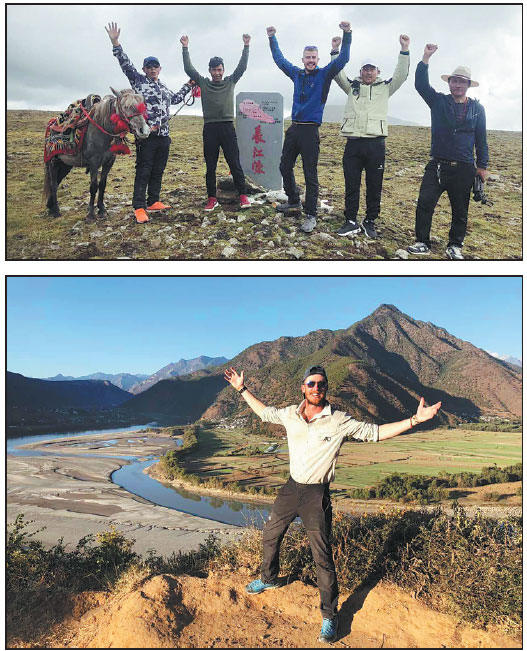And then there was one
Tan Yingzi in Chongqing
Updated:2019-03-18
China Daily
Nature takes its toll as a team of 11 takes on 6,400-km trek from mountain to sea
By the time Ash Dykes had reached Chongqing in Southwest China 178 days after setting out to trek the Yangtze River from its source to the sea he had shed 10 kilograms.
"The most difficult part of the journey is over," the British explorer, 28, told China Daily in Chongqing on Feb 27, nine days after he had reached the city.
To that point Dykes had completed about 3,900 kilometers of the expedition along the river throughout Qinghai, Yunnan and Sichuan provinces, and "all" he now needed to do was to cover the next 2,500 kilometers in 187 days or less to complete the entire journey within a year, a feat no one, absent recorded evidence, is believed to have accomplished.
Weighing 63 kg, 1.78 meters tall and dressed in a blue outdoor jacket and a pair of jeans, Dykes looked in fine fettle, even if a little skinny, as he chatted with China Daily in a cafe on the sidelines of a book-signing tour in Chongqing. "Chongqing is the first big city along the Yangtze, which is a milestone of my journey," he said.

On August 26 last year a three-men team, including two guides and a horse, hit the road at the starting point, the source of the Yangtze in the southwest of Zadoi county at an elevation of 5,170 meters in southern Qinghai province. Then at different times for the next two months after starting, different people had come to join him.
But Dykes has been walking solo since late October, when the last of those accompanying him quit. Along the way, one by one, they quit because of severe altitude sickness, injuries or the fear of the multitude of dangers, including bears, wolves, winter storms and intimidating terrain.
In early October in Yushu, Qinghai province, British photographer Martin Lyons decided to withdraw from the adventure after an encounter with a big landslide in the mountains on the first day of his journey.
"It's pretty scary. One step wrong and we wouldn't end well," the 41-year-old man recalled their climbing on the cliff of the mountain that day. "Ash is an extremely strong person both physically and mentally. I have a lot of respect for him."
The world's third-longest river stretches about 6,400 kilometers from the glaciers of the Qinghai-Tibet Plateau eastward through the cities of Chongqing, Wuhan and Nanjing before reaching the East China Sea in Shanghai.
On that journey the entire length of China's Mother River Dykes is expected to walk about 8 million steps. "There are very few world records left to be challenged nowadays," he said.
Born in the town of Old Colwyn in northern Wales, Dykes has achieved two world-first feats, trekking across Madagascar and Mongolia alone without outside help, during which he nearly died from malaria and severe dehydration. His book Mission Possible was published in Chinese in June last year.
"Many had warned me before that it was impossible to walk the Yangtze from the source to the sea," he said.
"Because the first section on the plateau (at an average of over 4,500 meters above sea level) and the barely inhabited mountain areas are too dangerous to cross."
In order to cross the plateau and mountains in good weather, the journey was planned to start in summer, but because of delays in preparations, Dykes arrived in Qinghai in late August as the days were becoming shorter and colder. Unwilling to wait for another year, he decided to press on.
Within a few days three of the adventurers were vomiting and bleeding, suffering from severe high altitude sickness, and they were forced to abandon the expedition.
In the mountains, the team had to light firecrackers to scare off bears, and on one occasion they were followed by a pack of wolves for two days, Dykes says.
"When we struggled in a snow blizzard and almost lost our way, we saw a monastery. The monks looked after us and told us we should not have come in winter."
Niang Caijiang, 28, a local teacher in Yushu, became Dykes' guide in mid October and quit due to leg injuries. "I learn persistence and courage from the British man," he said. "It is very dangerous walking in those wild and remote areas and walking day after day can be very boring and exhausting."
From Chongqing the river flows to the east through densely populated and developed areas before flowing into the East China Sea in Shanghai.
The rest of the trip would be much easier, Dykes said, and he urged members of the public to join him on some sections of the trek as a way of promoting the protection of the Yangtze River. He set out from Chongqing on the second half of the journey on March 11.
Earlier in February Dykes arrived in Yibin, Sichuan. As a volunteer of the China Biodiversity Conservation and Green Development Foundation, he took part in a number of environmental protection programs with the local Fish Protection Center and released dozens of endangered Chinese sturgeon into the Yangtze.
"Mission Yangtze is not only a human feat and world first, it's a mission to showcase the true beauty and wonders of China, (and) highlight the environment and positive work being done to protect it," he wrote on his social media WeChat account.
Cecille Elbeleidi, British Consul General in Chongqing, called Dykes "an excellent example of UK's dynamic and adventurous spirit." "I'm particularly pleased that, along with his expedition, he has been actively promoting environment conservation, reduced use of plastics and wild life protection," she told China Daily.
Thanks to technology, people can track Dykes' location every five minutes on his personal website (ashdykes.com). He also updates his journey on Sina Weibo, WeChat, Instagram, Twitter and Facebook.
Even as Dykes, and before him his companions, endured hardship, the huge diversity of nature and culture along the way deeply impressed him. "There are a lot of changes along the Yangtze, from freezing plateau to subtropical. I'm amazed by the beautiful landscape and rich culture."
But what has impressed him most, he says, is the friendliness and hospitality of local people, to the point of their sharing their tiny, modest woodland houses with him and providing anything else he needed, one of the most important things being local knowledge.
"When a pack of Tibetan mastiff were attacking us, several local men rushed in on their motors and drove off the big dogs. Those encounters with locals really have been the highlight of the journey."
Dykes, who studied outdoor education at college, said he had long wanted to travel the world, and first visited China, which had been at the top of his to-see list, in 2010, when he was 19. "As a child I read a lot about China and was always attracted to this ancient and mysterious country."
His first brief trip to Beijing and Shanghai served only to whet his appetite for more travel. Two years ago he began to prepare for the Yangtze expedition, including fitness training, high-altitude training, route planning, Chinese-language learning and finding out about local conditions.
"My adventures teach me to put things into perspective and never take things for granted. Hard work, persistence, dedication and good management of your expectations are my secret to complete 'mission impossible'."
tanyingzi@chinadaily.com.cn
|
British adventurer Ash Dykes stands by the Yangtze River in late December 2018 in Yunnan province. |
|
From top: On Aug 26, 2018, Ash Dykes hits the road at the starting point, the source of the Yangtze River in the southwest of Zadoi county at an elevation of 5,170 meters in southern Qinghai province. The two men on the left are his local guides and the two on the right are the national park ranger and his driver. Ash Dykes stands at the first bend of the Yangtze River in Yunnan province in late November, 2018. Photos provided to China Daily |
(China Daily 03/16/2019 page9)
Video

John Edwards, the UK trade commissioner for China, praised Chongqing over its rise as a burgeoning center in intelligent manufacturing.








